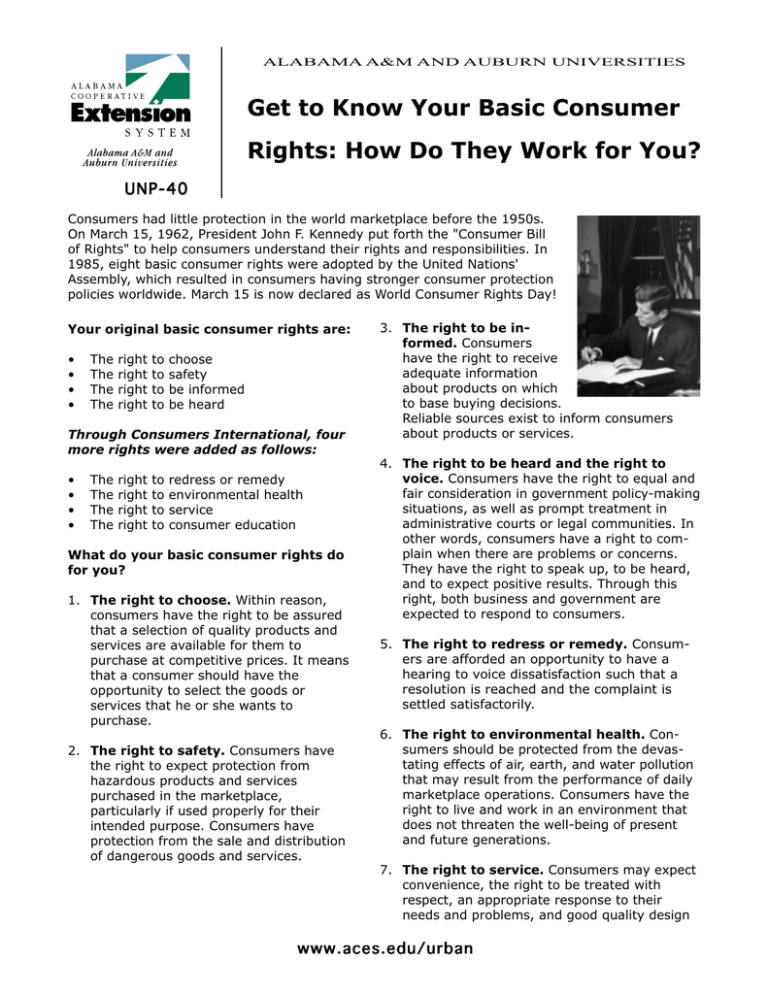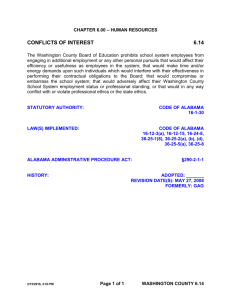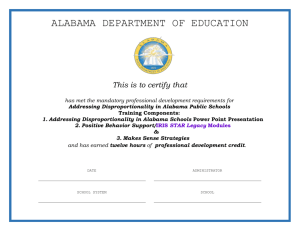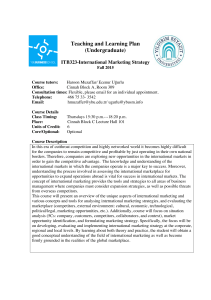
ALABAMA A&M AND AUBURN UNIVERSITIES
Get to Know Your Basic Consumer
Rights: How Do They Work for You?
UNP-40
Consumers had little protection in the world marketplace before the 1950s.
On March 15, 1962, President John F. Kennedy put forth the "Consumer Bill
of Rights" to help consumers understand their rights and responsibilities. In
1985, eight basic consumer rights were adopted by the United Nations'
Assembly, which resulted in consumers having stronger consumer protection
policies worldwide. March 15 is now declared as World Consumer Rights Day!
Your original basic consumer rights are:
•
•
•
•
The
The
The
The
right
right
right
right
to
to
to
to
choose
safety
be informed
be heard
Through Consumers International, four
more rights were added as follows:
•
•
•
•
The
The
The
The
right
right
right
right
to
to
to
to
redress or remedy
environmental health
service
consumer education
What do your basic consumer rights do
for you?
1. The right to choose. Within reason,
consumers have the right to be assured
that a selection of quality products and
services are available for them to
purchase at competitive prices. It means
that a consumer should have the
opportunity to select the goods or
services that he or she wants to
purchase.
2. The right to safety. Consumers have
the right to expect protection from
hazardous products and services
purchased in the marketplace,
particularly if used properly for their
intended purpose. Consumers have
protection from the sale and distribution
of dangerous goods and services.
3. The right to be informed. Consumers
have the right to receive
adequate information
about products on which
to base buying decisions.
Reliable sources exist to inform consumers
about products or services.
4. The right to be heard and the right to
voice. Consumers have the right to equal and
fair consideration in government policy-making
situations, as well as prompt treatment in
administrative courts or legal communities. In
other words, consumers have a right to complain when there are problems or concerns.
They have the right to speak up, to be heard,
and to expect positive results. Through this
right, both business and government are
expected to respond to consumers.
5. The right to redress or remedy. Consumers are afforded an opportunity to have a
hearing to voice dissatisfaction such that a
resolution is reached and the complaint is
settled satisfactorily.
6. The right to environmental health. Consumers should be protected from the devastating effects of air, earth, and water pollution
that may result from the performance of daily
marketplace operations. Consumers have the
right to live and work in an environment that
does not threaten the well-being of present
and future generations.
7. The right to service. Consumers may expect
convenience, the right to be treated with
respect, an appropriate response to their
needs and problems, and good quality design
www.aces.edu/urban
and workmanship in a product. Additionally, consumers may expect a courteous
manner while in a store or other establishment even if a purchase is not made.
Service means access to essential goods
and services to include adequate food,
shelter, clothing, health care, education
and sanitation – basic needs that should be
available to all consumers.
8. The right to consumer education. Consumers are extended the right to continuing
consumer education that supports the
benefits and enjoyment of other specific
rights. Consumers have the right to some
form of training and mastery of knowledge
and skills needed to make informed decisions in the marketplace.
Consumers are privileged to have rights; however, they come with certain responsibilities.
For example, it is a consumer's responsibility to
use products for their intended purpose and to
properly store and dispose of merchandise.
Consumers should be concerned with securing,
protecting, and asserting their rights in the
marketplace while trading and transacting
business to obtain fair value for goods and
services. Meanwhile, consumers should not
have to worry about the safety of the item they
purchase, or contend with false and misleading
advertising. Consumers have the responsibility
to seek, to evaluate and to use available information on products and services to make sound
buying decisions.
In the marketplace, consumers expect businesses
to offer a variety of goods and services at competitive prices. However, it is up to the consumer
to carefully choose products and services at
affordable prices and to express any concerns to
government or businesses if these products or
services do not meet their expectations.
Consumers want pure air and water, safe and
responsible waste disposal, the preservation of
natural resources, and effective conservation
measures. In other words, consumers want
respect for the earth and the overall environment where the beauty of nature can be enjoyed and relished by all.
When you seek consumer education through
the Alabama Cooperative Extension System
(ACES), you are exercising one of your basic
consumer rights. Information you get through
ACES will help you function in the marketplace
as you become a savvy consumer.
References
Campbell, S. R. (2000). The confident consumer.
Tinley Park, Illinois: The Goodheart-Willcox
Company, Incorporated.
Choice. (October 2005). The eight basic consumer
rights. Retrieved November 3, 2008, from http://
www.choice.com.au/viewArticle.aspx?
id=100736&catId=100528&tid=100008
Consumers International. (n.d.) History and purpose.
WCRD. Retrieved November 3, 2008, from http:/
/www.consumersinternational.org/Templates/
Internal.asp?NodeID=95043
Garman, E.T. (2000). Consumer economics in
America (6th ed). Cincinnati, Ohio: Dame.
Kimbrell, G., & Swanson, P.W. (1996). Personal and
family economics. New York: West Publishing
Company.
Lush, M. J. and Hinton, V. (2008). Consumer bill of
rights. Retrieved November 3, 2008, from http://
www.answers.com/
Consumer%20bill%20of%20rights
Bernice B. Wilson, Extension Resource Management Specialist, Alabama
A&M University
For more information, call your county Extension office. Look in your telephone directory
under your county’s name to find the number.
Published by the Alabama Cooperative Extension System (Alabama A&M and Auburn Universities) in cooperation with the
U.S. Department of Agriculture. An Equal Opportunity Educator and Employer.
Updated December 2008; UNP-0040
UNP-40
© 2008 by Alabama Cooperative Extension System. All rights reserved.









